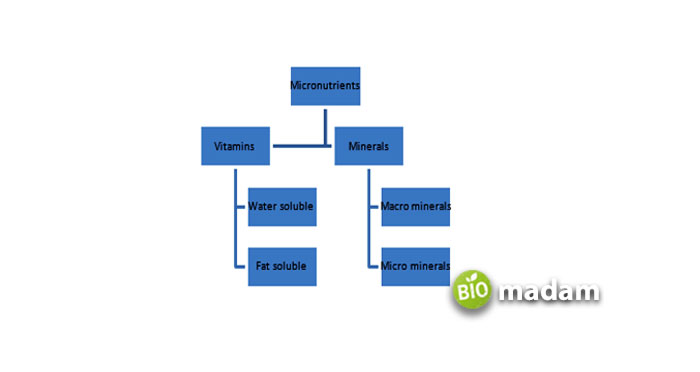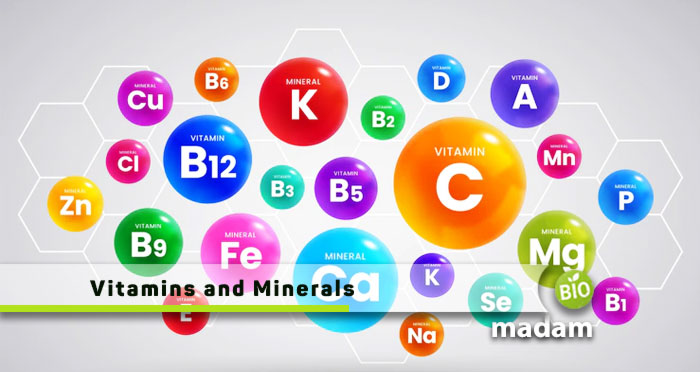The human body requires an adequate amount of nutrients to carry out anatomical and physiological functions. Besides various types of fats, proteins, and carbohydrates, taking the recommended daily value of vitamins and minerals is also essential for health.
Just like carbs and proteins, micronutrients, i.e., vitamins and minerals also contribute to bodily processes. These help in fighting infections and diseases. An increase or decrease in such nutrients may lead to diseases like rickets, anemia, alopecia, etc.
Read further to learn about micronutrients and the differences between vitamins and minerals.
Comparison Table
| Characteristics | Vitamins | Minerals |
| Origin | Plants & animals | Earth |
| Chemical Nature | Organic | Inorganic |
| Classification | Fat-soluble & water soluble | Macro and micro minerals |
| Requirements | All 13 vitamins | Not all minerals |
| Function | Energy growth and processing | Help maintain acid-base balance |
| Heat Sensitivity | Yes | No |
| Examples | Vit. A, B, C, D, E, K | Fe, Ca, Mg, etc. |
What are Micronutrients?
Micronutrients and macronutrients are required by the body for different processes. The word “micro” in micronutrients means “small.” Thus, it translates to “nutrients required in small amounts.”
Micronutrients are needed by your body in small amounts to carry out physiological processes. They are also involved in development and growth. Just like carbs and proteins, vitamins and minerals maintain your health by enabling biochemical processes and strengthening organs within the body.
Vitamins are essential for building different immunity types, energy needs, and other functions. Alternatively, minerals facilitate fluid balance and bone health besides other processes.
Vitamins and minerals are divided into fat-soluble vitamins, water-soluble vitamins, trace minerals, and macrominerals. You can take all these minerals and vitamins through food and supplements.

What are Vitamins?
Vitamins are essential micronutrients as our bodies cannot produce them on their own. They have various biochemical functions in the body and contribute to metabolic processes.
There are thirteen vitamins important for bodily functions. They are typically obtained from plants, animals, and fungi (on exposure to ultraviolet rays). Taking the right amounts of micronutrients helps maintain optimal health. Each of the vitamins performs a particular function and may lead to diseases in case of deficiencies.
Sometimes, people wonder how they are deficient in vitamins despite eating different kinds of vegetables regularly. It is important to keep in mind that heat or other chemicals during cooking may destroy the vitamins. Taking vitamin-rich foods in raw form is better to enjoy all the goodness.

Types of Vitamins
Vitamins are widely classified into two categories; fat-soluble and water-soluble.
Water Soluble Vitamins
As the name suggests, water-soluble vitamins are readily absorbed into the bloodstream and facilitate energy-producing processes. Vitamin C and B complexes (riboflavin, thiamin, niacin, folate, biotin, pantothenic acid, B6, and B12) are water-soluble.
Fat Soluble Vitamins
Fat-soluble vitamins do not directly dissolve in water and require fats to be absorbed. Our fatty tissues and liver store the fat-soluble vitamins to use over time. Vitamins A, D, E, and K are fat-soluble vitamins.
Functions of Vitamins
Vitamin A
Vitamin A, also known as Retinol, is an essential vitamin and contributes to good vision and the immune system. You can obtain vitamin A from citrus fruits, leafy green vegetables, cereals, and whole milk.
Vitamin B
Vitamin B complex comprises 8 vitamins, including B1, B2, B3, B5, B6, B7, B9, and B12. They all contribute to body growth and metabolism yet perform different functions.
The functions of the Vitamin B complex are as follows:
| Vitamin B | Other Name | Function |
| B1 | Thiamine | Regulation of carb metabolism |
| B2 | Riboflavin | Respiration, regulation & metabolism |
| B3 | Niacin | Acid & hydrogen transfer in metabolism |
| B5 | Pantothenic acid | Metabolism |
| B6 | Pyridoxine | Protein anabolism |
| B7 | Biotin | Coenzyme |
| B9 | Folic acid | Hemoglobin and protein synthesis |
| B12 | Cyanocobalamin | Erythrocyte synthesis |
Vitamin C
Vitamin C is an important vitamin required for the repair and growth of tissues in the body. It helps in repairing ligaments, tendons, skin, and blood vessels (arteries, veins, and capillaries). Citrus fruits, tomatoes, spinach, strawberries, and green peppers are rich in vitamin C.
Vitamin D
Vitamin D is a fat-soluble vitamin that helps absorb calcium in the body along with phosphorous. Thus, it is critical for bone health and controlling infections. Egg yolks, milk, tuna, yogurt, and salmon are rich vitamin D sources. The good part is, you can even freeze salmon for up to two months.
Vitamin E
Vitamin E is an antioxidant source that helps protect the body cells from damage from free radicals. You can obtain vitamin E from almonds, sunflower seeds, spinach, red bell pepper, and pumpkin.
Vitamin K
Vitamin K is vital for blood clotting and contributes to bone health by producing bone tissue to avoid issues like osteoarthritis and rheumatoid arthritis. Cauliflower, broccoli, asparagus, parsley, and liver are rich natural sources of vitamin K.
What are Minerals?
Minerals are naturally occurring inorganic compounds obtained from water and soil. They help in blood coagulation, regulating heartbeat, supporting muscle function, producing hormones, and acting as a secondary messenger for the release of neurotransmitter.
Like vitamins, minerals also have to be taken in adequate amounts for a properly functioning body. Some minerals also contain electrolytes that help regulate muscular and nervous systems besides maintaining water balance in the body. Disturbance in electrolyte balance can lead to several health conditions or diseases. They may also indicate underlying issues like kidney damage.

Types of Minerals
While minerals are required in smaller amounts, they are further divided into micro and macro minerals.
Micro Minerals
Micro minerals are those required in lesser amounts compared to macrominerals. They are also known as trace minerals and are needed in minute quantities. Despite the small quantity, negligence in taking micro minerals can worsen health. Micro minerals include copper, cobalt, manganese, iodine, selenium, and fluoride.
Macro Minerals
Micro minerals are required in a comparatively higher quantity than micro minerals. However, their RDV is not the same as macronutrients. Macro minerals include iron, calcium, phosphorous, magnesium, and zinc. They play a vital role in maintaining body functions.
Functions of Minerals
Calcium
Calcium is well-known for its role in bone and teeth development. It is a macro mineral and plays a major role in blood clotting, nerve functioning, immune health, blood pressure regulation, etc. Dairy, soymilk, legumes, tofu, and bony fish are natural sources of calcium.
Iron
Iron is a micromineral yet immensely crucial for the body as it is the main element of red blood cells. It is also used for energy metabolism, however, iron deficiency can result in anxiety and, in severe cases, depression. You may obtain iron from dried fruit, poultry, red meat, prunes, shellfish, etc.
Iodine
Iodine is an important part of normal thyroid function in the body and helps regulate metabolism, growth, and thyroid hormone. It is present in seafood and iodized salt.
Phosphorous
Phosphorus contributes to healthy bones and teeth and regulates acid-base balance. Liver, milk, fish, meat, broccoli, eggs, and potatoes are rich in phosphorus.
Potassium
The body requires potassium for nerve transmission, fluid balance, and muscle contraction. You can obtain potassium from milk, legumes, whole grains, and meat that can stay for days in the fridge.
Zinc
The body requires zinc to synthesize genetic material and different types of proteins in the body. It also improves immune health, healing, and sexual function. Fish, poultry, meat, and vegetables are rich sources of zinc.
Chloride
Chloride helps the body balance fluids and stimulates the production of stomach acid. Salt and soy sauce are everyday sources of chloride.
Manganese
Manganese is required in relatively small amounts in the body yet plays a significant role in enzyme synthesis. Add fish, legumes, grains, and nuts to your diet for daily manganese intake.
Selenium
Selenium is another micromineral that protects your body from free radicals and eventually reduces tumor chances; either malignant or benign. Seafood, walnuts, and meat are plentiful in selenium.
Molybdenum
Molybdenum in leafy green vegetables, milk, and liver is a crucial component of some enzymes. Your body utilizes molybdenum to process genetic material like DNA and genes.

Similarities Between Vitamins and Minerals
- Vitamins and minerals are micronutrients.
- They must be obtained from external sources as the body cannot synthesize them.
- Negligence in taking vitamins and minerals can lead to health issues.
Difference Between Vitamins and Minerals
Definition
Vitamins
Vitamins are organic compounds needed by the body in micro amounts.
Minerals
While, on the other hand, minerals are inorganic compounds used by the body in small amounts.
Origin
Vitamins
Vitamins are extracted from animals, plants, and fungi using different sources, such as utilization of UV-B rays on fungi.
Minerals
On the contrary, minerals are found in the earth and soil and extracted from water reserves.
Requirement
Vitamins
There are 13 vitamins known so far, and all are essential for normal body function and growth.
Minerals
Numerous minerals are found in nature, yet all of them are not required by the human body.
Classification
Vitamins
Vitamins are classified into water-soluble and fat-soluble vitamins according to their nature.
Minerals
Minerals, in opposite, are categorized as micro minerals and macro minerals, depending on their requirement.
Functions
Vitamins
Vitamins help release energy from food and help maintain healthy body function. They also contribute to clotting factors and red blood cells.
Minerals
In contrast, minerals contribute to the formation of body structures like bones and help in muscle contraction.
Heat Sensitivity
Vitamins
Vitamins are pretty sensitive, such that chemicals and heat can easily damage them.
Minerals
On the contrary, minerals are less vulnerable to heat and chemical agents.
Examples
Vitamins
Vitamin A, B, C, D, E, and K are examples of vitamins needed by the body.
Minerals
Examples of minerals required by the body include iron, magnesium, calcium, phosphorus, manganese, etc.
FAQs
What is the difference between minerals and nutrients?
Minerals are a sub-class of nutrients belonging to the micronutrient division. They are obtained from the earth and ocean and are responsible for various bodily functions. Iron and calcium are among the most important minerals required by the body for proper functioning and development.
What are the 7 major minerals?
The seven major minerals required in high amounts by the body are calcium, sodium, potassium, phosphorus, chloride, magnesium, and sulfur. They contribute to bone and muscle health besides maintaining vital organs like the heart and liver.
What is the same about vitamins and minerals?
Vitamins and minerals are both micronutrients and are required less than macronutrients. They are not produced by the body and must be taken from external sources. You may intake vitamins and minerals from natural sources or supplements.
Are minerals better than vitamins?
You cannot compare the significance of vitamins and minerals as both contribute to specific bodily functions, and are equally important. However, vitamins are more vulnerable to changes under heat or chemical influence than minerals. Your body needs all 13 vitamins for proper functioning alternative to minerals found in nature which only a few are essential for health.
The Bottom Line
Vitamins and minerals are micronutrients vital for different body functions and growth. Vitamins are important organic compounds, whereas minerals are inorganic compounds. The major difference between vitamins and minerals is their source and origin. Vitamins are obtained from animal and plant sources. Alternatively, minerals can be extracted from the ocean and soil. Taking micronutrients in adequate amounts is essential for a healthy body.

Hello, I would like to introduce myself to you! I am Chelsea Rogers, an experienced blog writer for science articles, holding an MPhil degree. My enthusiasm to grab the best knowledge, let it relate to botany, zoology, or any other science branch. Read my articles & let me wait for your words s in the comment section.

